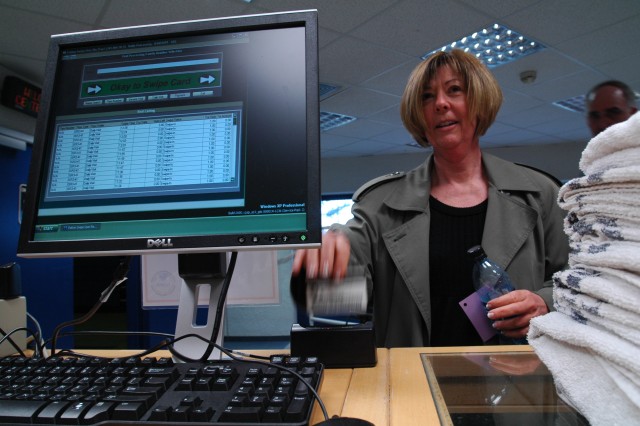
HEIDELBERG, Germany -- Gone are the days of scribbling your name on a clipboard before entering a fitness center.
"(We're) trying to get our facilities into the 21st century," said Rafael Santaliz, director, Family and Morale, Welfare and Recreation for U.S. Army Garrison Baden-WAfA1/4rttemberg.
Now FMWR patrons will only need to place their ID cards into a card reader, wait for the beep, and head to their workout.
But, the RecTrac system does more than just track gym patrons.
"(It's) a great management tool for our people, because RecTrac can do so many things," Santaliz said. "(It) allows (managers) to make good management decisions on how they operate programs and facilities."
Installation Management Command-Europe began installing RecTrac systems in the fall, and Santaliz said he expects all the FMWR facilities to have the system by the summer.
"Now everybody has to come to the facilities with their ID cards and scan in," he said. "But you (show) it at the PX, at the commissary; you (show) it at the medical facilities. It's just a new way of doing business."
The Army-wide program has been used in the U.S. for a number of years, and now it's coming to Europe.
The system allows FMWR managers to track not only when customers are using the facilities and services, but the frequency of visits, the demographics of who is visiting when and more, allowing facility managers to decide on staffing needs.
The system also integrates financial data into the mix, tracking receipts and inventory, giving managers one more tool to leverage to make the best decisions for the facility.
"For the big Army headquarters, they can also track which installations are making money and losing money, and it also drives the money," Santaliz said. "So if you have programs that are not being supported, they can say either you increase participation, or you close them down."
Signs posted at Patton Fitness Center in Heidelberg remind patrons that scanning their card ensures future funding.
For patrons used to signing a clipboard, Santaliz said the system speeds up the process. Once a customer has registered in the community, he only has to scan his card, instead of writing his name and unit on a piece of paper.
For large events, the staff can bypass the system and just take a head count and manually enter the information in at a later time.
Right now, Santaliz said the system only registers patrons for their community, and when they visit another community for temporary duty or other reasons they would have to register in that community as well.
The issue is a telecommunications issue, which Santaliz said also affects customers of the Heidelberg Golf Course and the Rod and Gun Club near Oftersheim.
There is no link between the Heidelberg system and those locations, so patrons would have to register again at those facilities.
RecTrac is also not compatible with current customer tracking programs from CYSS and ACS. Those systems will remain stand-alone systems, and customers will not use RecTrac for these services.
Santaliz said that local nationals and NATO partners cannot use the system yet, but his staff is looking into ways to use their current installation passes to include their information in the system.
In the meantime, they can still sign in on a clipboard, and the staff will enter the daily head count into the system. The clipboard method will also work for those who forget their ID card, but the staff will ask to see the card on the patron's next visit.
"(The) customer service part of our business is to try to make this seamless for the patrons," he said.
(Editor's Note: Jason L. Austin works in the USAG Baden-Wuerttemberg Public Affairs Office).

Social Sharing